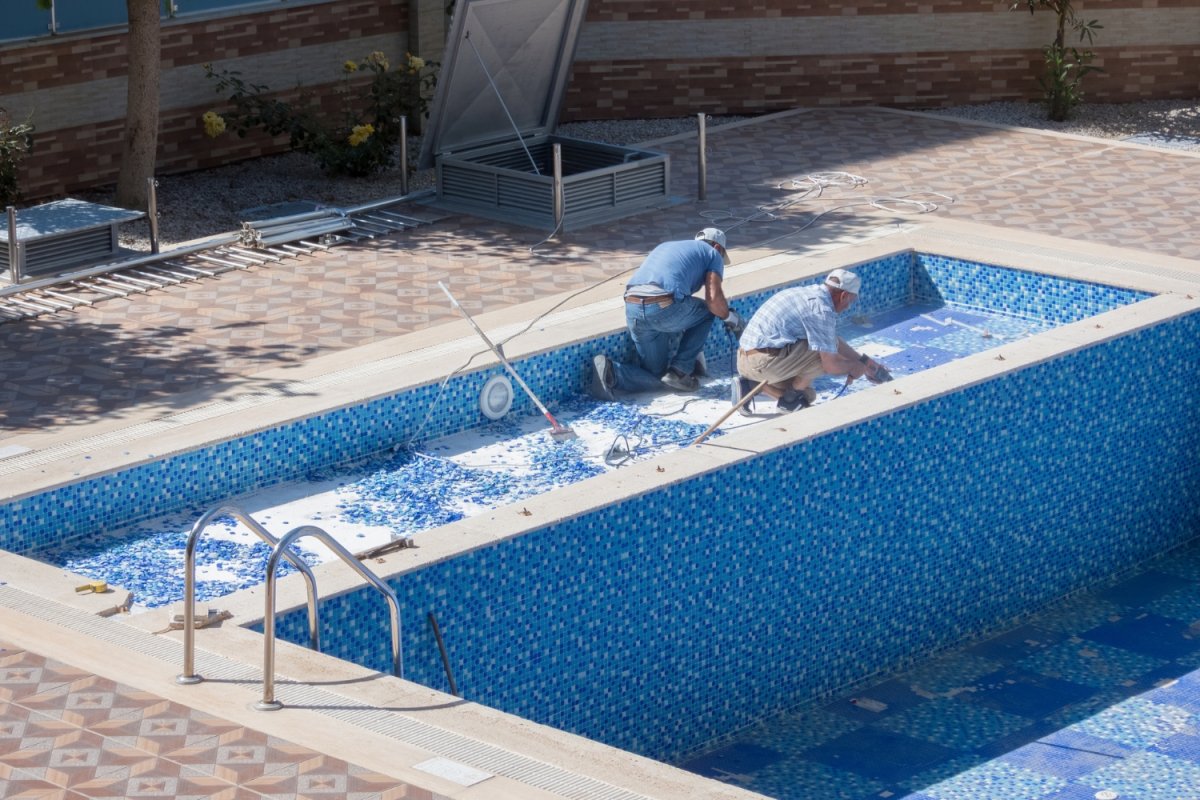We may earn revenue from the products available on this page and participate in affiliate programs. Learn More ›
Highlights
- Pool repair costs about $680, though a typical range is $238 to $1,134.
- The type and size of pool and liner, the type and extent of damage, and labor costs make up the majority of pool repair costs.
- Water-level fluctuations, poor water flow, higher-than-normal utility bills, excessive algae growth, and unusual noises are common signs that it’s time to have a pro inspect and repair the pool.
- Some liners are easy for a homeowner to repair, but most pool repairs are more complicated and require the help of a professional pool company. Some warranties also require professional repair to ensure the warranty isn’t voided.
Plunging into crystal-clear water after a long day makes owning and maintaining a pool totally worth it—as long as the pool is always ready to use. By handling repairs as soon as possible, homeowners can ensure the pool is always clean and usable. The cost of those repairs quickly adds up depending on the pool’s size, the type of installation, the liner material, and the type of repair needed. Keeping an eye out for certain pool issues like leaks, algae buildup, equipment malfunctions, and increased utility bills all alert homeowners to problems that need to be addressed quickly. Typically, pool repair costs fall between $238 and $1,134, but they average about $680, according to Angi.
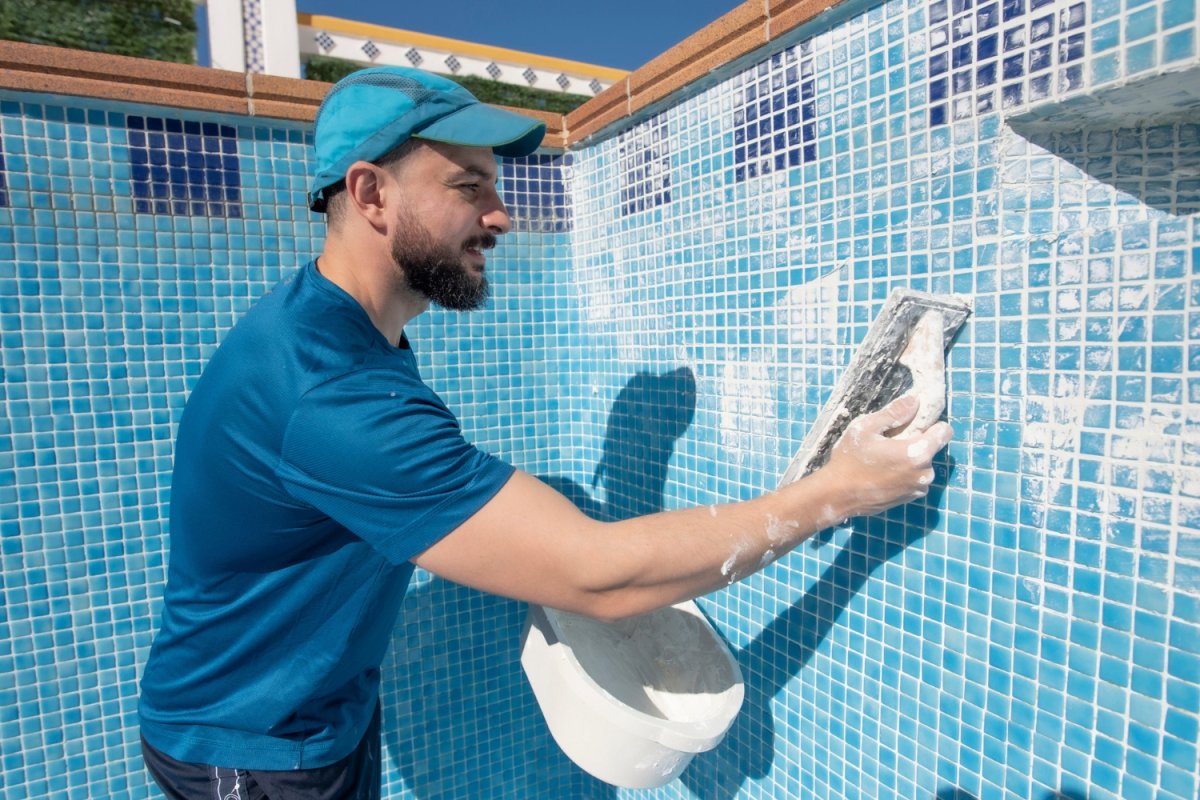
Factors in Calculating Pool Repair Cost
Installing and maintaining a pool can be a sizable investment regardless of whether the homeowner paid cash or opted for one of the best pool loans. According to Jimmie Meece, brand president at America’s Swimming Pool Company, “The main factors that will impact the cost [of repairs] include size of the pool and the material its made with, the type of repair needed and the severity of the damage, the location of the repair and how hard it is to access, the quality of any previous work or installation, and the time of year you are doing the repairs.”
Pool Size and Type
While a task like repairing a small leak or replacing a pool light may not be closely related to the pool’s size, other repairs are directly impacted by the size of the pool. The cost of resurfacing the pool, for instance, requires sufficient materials to complete the job, and larger pools will require more labor than smaller pools. Equipment repairs, like replacing filters and fixing or replacing pumps and heaters, will cost more for larger pools since larger-capacity parts tend to cost more.
The type of pool also impacts the cost of pool repairs. Typically, inground pools cost more to repair than above-ground pools. This is due in part to the fact that inground pools tend to be larger than above-ground pools, so they will cost more to drain, fill, and treat. Above-ground pool repairs range from $100 to $700, while inground pool repair cost typically falls between $350 and $2,700.
Pool Liner Type
Replacing the pool liner costs between $1,125 and $3,688 but will ultimately depend on the type of liner the pool has. A vinyl liner is the least expensive, with repairs costing between $130 and $2,500. Fiberglass liner repairs cost between $300 and $6,500, and concrete pool repairs average $10,000 to $20,000. Some minor pool liner repairs can be completed using a DIY patch kit for $20 to $50.
Repair Type and Damage Extent
While the size of the pool and type of liner will impact the total pool repair cost, the type of repair and extent of the damage will be the largest factors to consider while homeowners are calculating pool repair cost. Pool repair technicians are able to repair small leaks; resurface pools; repair or replace the heater, pump, or filter; replace lights; and fix the skimmer. If homeowners know there’s a problem with their pool but aren’t sure what the issue is, they can contact one of their local pool repair companies to have them inspect the pool and prepare an estimate.
Labor
Some minor pool repairs are doable as a DIY project by the homeowner, but hiring a pool repair professional is the best option to ensure the repairs are done well. This can also save time and money down the road. Labor for pool repairs typically falls between $45 and $65 per hour, but these rates will depend on the season, geographic location, type of repair, and type of pool.
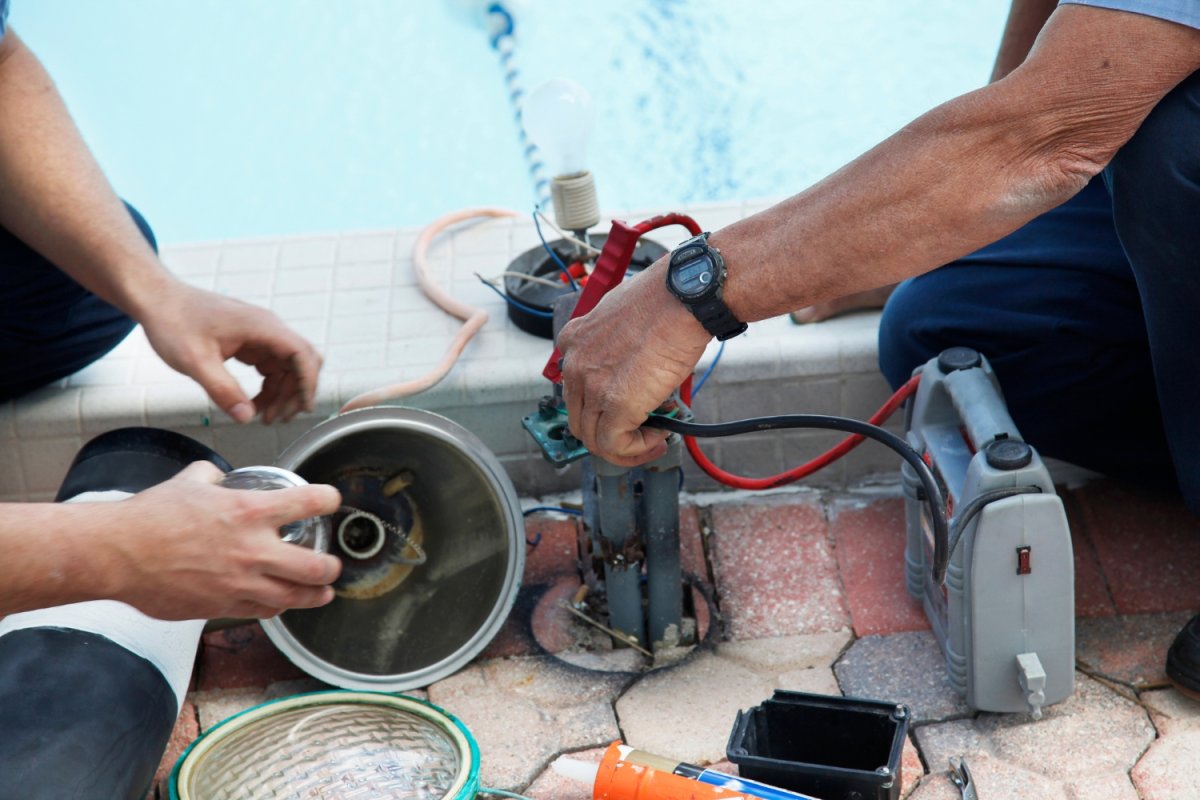
Additional Costs and Considerations
The cost of pool repairs can also extend to deck repairs, landscaping, and pool maintenance. Keeping the pool deck free of cracks, loose boards, and other problems helps protect pool users from injuries. In addition, maintaining landscaping around the pool area contributes to the overall look of the pool area and even adds shade. Conducting regular pool maintenance helps cut down on repair costs over time, though there are ongoing costs to consider.
Pool Maintenance
Regular pool maintenance costs typically fall between $115 and $352, but the actual amount and frequency of the costs will depend on the type of pool maintenance homeowners need. Annual maintenance can add up to between $960 and $1,800; this cost range may include opening and closing the pool, conducting repairs, testing and balancing the water, skimming and vacuuming debris, replacing the filters, and repairing pumps and heaters.
Regarding pool maintenance, John Uhle, a product expert at Discount Salt Pool in Houston, Texas, emphasizes that “maintaining the chemical balance and timely replacement of filters will save owners from a lot of problems. Regular maintenance and inspection of pool equipment can extend [the pool’s] lifespan and help catch small issues before they grow into big and costly ones.”
Deck Repairs
Keeping the deck in good shape not only makes the pool area look appealing, but it’s also important for safety. A damaged deck can cause a pool user to trip or experience other injuries. A professional will repair a deck by fixing any cracked, loose, or damaged boards; painting or staining the surface; or replacing the deck altogether. Deck repair costs range from $300 to $3,000, depending on the type and extent of repairs.
Landscaping
Tall landscaping around the pool offers much-needed shade on hot summer days, while lower-growing flowers and plants make the area more naturally appealing. But landscaping requires maintenance to keep it looking its best during the growing season. Homeowners looking to save on costs may want to tackle some maintenance, such as weeding the beds and watering the plants themselves, but projects like planting a tree cost $100 or more if hiring a pro. Hiring a landscaping service costs between $4.50 and $12 per square foot depending on the type of work they’re doing.
Pool Repair Cost by Type of Repair
Ultimately, the total pool repair cost will depend on the type of repair. Small leaks can be a low-cost fix with a DIY patch kit or a pool service and repair company, but the more severe the damage is, the more it will likely cost to repair it. Uhle explains, “The most common pool malfunctions include leaks, surface damage, and problems with equipment.” He goes on to say that “Minor things, such as small leaks or replacing a few tiles, will cost less than major repairs, such as repairing structural cracks or completely replacing the cover.”
| Type of Pool Repair | Average Cost (Materials and Labor) |
| Beam repair | $75 per linear foot |
| Drain and refill | $180 to $230 (to drain); $55 per 5,000 gallons (to refill) |
| Drain repair | $400 to $700 |
| Filter replacement | $1,500 to $2,000 |
| Heater repair | $160 to $730 |
| Leak detection | $100 to $500 |
| Leak repair | $10 to $3,500 |
| Light replacement | $630; $20 to $100 per bulb |
| Liner replacement | $130 to $20,000 |
| Pool resurfacing | $5,500 to $30,000 |
| Pump replacement | $700 to $1,300 |
| Skimmer repair | $50 to $300 |
| Tile replacement | $25 per square foot |
Beam Repair
The pool beam is the top section of concrete that is extra thick and forms the pool’s perimeter. The pool coping is installed on top of the beam, and together they form the structure that keeps the pool’s shape intact. A cracked pool beam can be an expensive repair, costing $75 per linear foot to remedy. If the crack is large, it can cost between $4,000 and $5,000 to repair.
Drain and Refill
Most professional pool companies charge $180 to $230 to drain a pool. It then costs about $55 per 5,000 gallons of water to fill it. A smaller pool holds around 10,000 gallons, while larger pools can hold 30,000 gallons or more. Draining pool water may require a wastewater permit, so it’s important for the homeowner to check with their pool repair company or municipality to determine if a permit is necessary.
Drain Repair
If something goes wrong with the drain or feed line, homeowners may want to discuss solutions with their swimming pool repair service to see if it makes sense to repair the problem or replace the drain altogether. Drain repairs cost between $400 and $700 and will likely include the cost and the labor it takes to drain the pool before the repairs and refill the pool after.
Filter Replacement
Pool filter costs are a common maintenance fee, since filters are heavily used. The filter cartridge typically lasts between 2 and 3 years. Sand filter media lasts between 3 and 7 years, while glass filter media lasts up to 10 years. If the filter is nearing the end of its lifespan or is clogged or damaged, it’s likely time to replace it. Filter replacement costs between $1,500 and $2,000, including labor, though the filter alone costs between $150 and $1,000.
Heater Repair
The cost of pool heater repair will depend on the extent of damage and the type of heater: electric, natural gas, or solar. Repairs typically fall between $160 and $730, which is significantly lower than the cost of a new pool heater. As heaters have varying manufacturing specifications, homeowners will want to verify that the swimming pool repair service has worked on their particular type of heater previously and can service it properly.
Leak Detection and Repair
If homeowners suspect there is a leak in their pool, they can learn how to find the pool leak and possibly do a DIY leak patch. However, if they’re not sure what they’re doing or think the leak is too big for a small patch job, it might be time to call in the pros. Pool leak repair costs typically fall between $10 and $3,500 while a leak detection fee could cost between $100 and $500.
A professional pool service may include small leak patching with their leak detection services, but it’s best to check beforehand so homeowners know exactly what they’re paying for. Some services will charge an hourly rate of $75 to $125 for leak detection and pool leak repair.
Light Replacement
Pool lights provide visibility in the dark to avoid accidents. Fully replacing lighting costs around $630 for a full unit, while pool light repair costs fall between $65 and $150 per light. If homeowners just need to replace a bulb, it costs between $20 and $100.
Liner Replacement orPool Resurfacing
If the pool liner is in bad shape and needs to be replaced, the total replacement cost will depend on the size of the pool and the type of liner. Pool liner replacement costs between $1,125 and $3,668 on average. Repairing a concrete liner averages $10,000 to $20,000, repairing a fiberglass liner costs about $300 to $6,500, and repairing a vinyl liner costs $130 to $2,500.
Resurfacing a pool is an option for fiberglass and concrete pools and can include repainting, replastering, or retiling the surface. Pool resurfacing costs will vary widely, depending on the type of resurfacing material needed for the pool. Most inground pools cost $6,000 to $15,000 to resurface. The cost to replaster a pool falls around $5,500 per 1,000 square feet, while resurfacing with aggregate will cost around $6,500. Tile is the most expensive resurfacing material at $30,000 per 1,000 square feet.
Pump Replacement
Uhle notes that “pumps often leak due to cracked seals, or [they] can have problems with motors.” So, if the pump motor isn’t working the way it should, it’s possible for a swimming pool repair service to complete the pool pump repair for a cost of $50 to $300. If the pump is beyond repair, then a replacement pool pump costs between $700 and $1,300. A pool equipment repair professional will be able to help homeowners determine if they need to replace the pool pump motor or the whole pump.
Skimmer Repair
To repair a skimmer costs between $50 and $300, with common skimmer leaks averaging around $100 to $130. If the skimmer is too damaged or worn out, a new skimmer can cost upwards of $1,200.
Tile Replacement
Tile replacement costs can add up quickly, especially if the entire pool is tiled. Some pool owners choose to add a decorative strip of tile at the top of the pool, which reduces installation and repair costs. Tile replacement starts at around $25 per square foot.
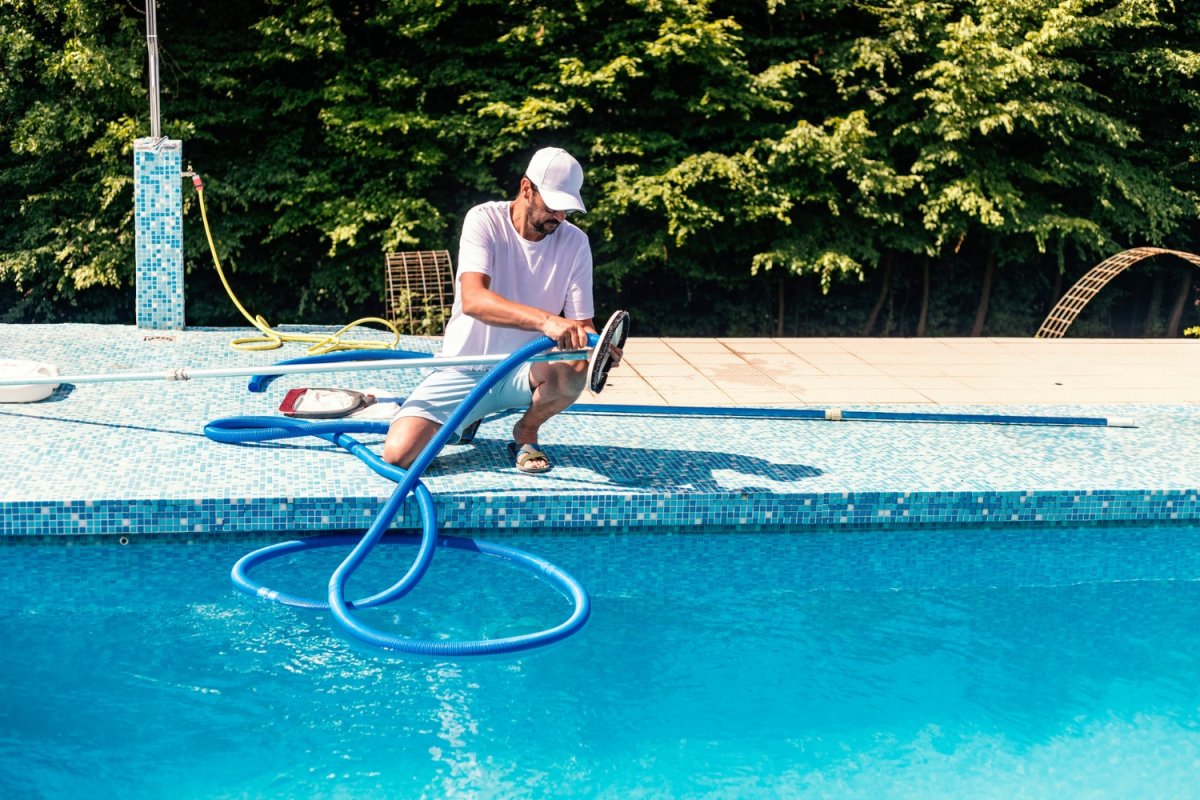
Do I need pool repair?
Homeowners who own a pool will need some type of swimming pool repairs at one point or another. But there are a number of signs that indicate pool repair is in the near future or needed immediately. To determine which repairs are actually necessary, it may be worth paying the cost of a pool inspection when issues arise.
Water Level Fluctuations or Poor Water Flow
Taylor Brinson, a representative for GPS Pools in Lutz, Florida, says, “If a pool’s water level drops an excessive amount in a short period of time, this could be a sign of a leak in the pool’s structure or PVC [pipes] underground. If a pool pump will not prime, is making a strange noise, or will not turn on, this could also be a sign a repair is needed.”
Meece says that “lack of water circulation in the pool is an important problem to address.” A common concern is that “standing water quickly becomes a breeding ground for all kinds of issues and means the pool’s chemicals aren’t being distributed properly to keep the water disinfected.”
If homeowners notice that the pool’s water level is going down faster than normal or there is poor water flow, they’ll want to call a pro to investigate and take steps to get it repaired before it causes other issues like a damaged pump.
Increased Utility Bills
Brinson notes, “If there is an increase in electric bills, this could indicate that the pool equipment is running for longer than its normal schedule.” If homeowners notice increased utility bills without a reasonable explanation, it’s probably time to call a professional and have them conduct a pool inspection to find the cause.
Discolored Water orAlgae Growth
Homeowners may be curious to know why their pool is green. If they see algae growth, it could be a sign that the water isn’t circulating properly due to a broken or damaged pump. It could also be a sign that the filter simply needs to be replaced.
Unusual Noises
Unusual grinding or squealing sounds are likely a sign that a pump repair is needed. Meece tells us, “If the pump starts making unpleasant noises, that’s a big tip-off that there may be a clog.” In the case of unusual noises coming from the pump, it’s best for homeowners to call in the pros instead of trying to eliminate the problem on their own.
Visible Damage
While some pool problems are difficult to diagnose, visible damage can be quite noticeable. Issues like cracks, an uneven pool deck, rust, broken or missing tiles, and other visible damage are best addressed as quickly as possible to prevent additional damage or potential injuries.
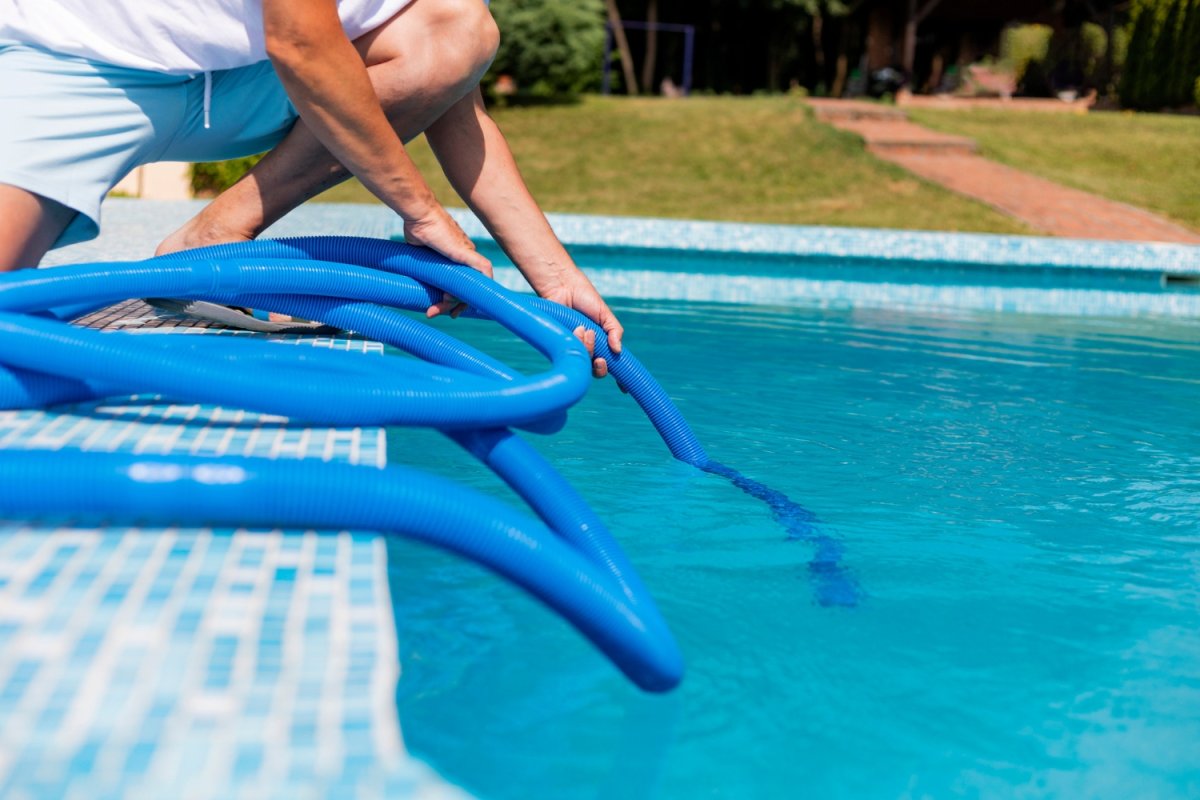
DIY vs. Hiring a Professional
Homeowners may be able to identify small liner leaks and patch them with a DIY patch kit. But many pool repairs should be left to professionals to ensure the equipment is repaired properly and to the manufacturer’s specifications. Brinson says this applies particularly to certain repairs like replacing the pump motor or the entire pump and filter installations, which “can be more intensive and may require a technician.” If equipment needs to be installed, she recommends leaving the job to a technician, since “most manufacturers require a technician to [do the installation] for the warranty to be valid.”
One of the best things that homeowners can do to keep their pool in good shape is to conduct regular maintenance. Brinson says this “includes making sure their pool water is properly balanced, the filter is cleaned or backwashed monthly, debris is vacuumed or netted out regularly, and the water level is at the proper height.” Homeowners are often able to do this work themselves, but they may find the professional pool service cost is worth it. The best pool cleaning service professionals may be able to spot a leak or another issue faster than the homeowner, which could ultimately save on repair costs.
How to Save Money
Pool repair costs are a necessary part of pool ownership. While some costs may be unexpected, others may fall into regular maintenance, such as replacing the filter or draining and refilling the pool. Homeowners will benefit from several tips to save on pool repair costs.
- Stay on top of maintenance. Scheduling regular maintenance will help make sure upkeep like cleaning or filter replacement doesn’t blossom into bigger issues.
- Schedule off-season maintenance. Ordering a pool inspection and completing any repairs during the off-season can reduce costs in areas where the weather permits.
- DIY patch repair. Homeowners may want to do DIY fixes for small leaks.
- Verify warranty information. Keeping pool warranty information handy can help homeowners know what repairs are covered and help them avoid paying for anything still under warranty.
- Plan ahead and save for potential repairs. Pool repairs are bound to happen, since water can be hard on mechanical parts. Saving ahead for potential repairs may lessen the burden of a costly repair when the time comes.
- Look into home warranties for pools. Homeowners may want to look into the best home warranty for pool coverage from companies like Choice Home Warranty and American Home Shield.
Questions to Ask a Pro
If homeowners realize that the pool has a leak or is otherwise in need of repair, calling one of the best pool installation companies or repair services can help get the problem fixed as quickly as possible. Since much of the pool equipment—underground pipes, pump, and filter—isn’t visible, a pro has the advantage of knowing where to look to find the source of the problem. To understand the possible issues and process of detecting and repairing a pool, homeowners are advised to ask several questions during the vetting process.
- Are you properly licensed to complete this work?
- Will you provide a report with repair recommendations?
- How much do you charge for an inspection?
- How will you adhere to any warranty requirements?
- How long will repairs take?
- Will the part need to be replaced, or can it be repaired?
- Will you need to drain the pool to perform the repair?
- Are any permits required? If so, who is responsible for pulling them, and what will they cost?
- Are you experienced at repairing my type of pool?
- What can I do to prepare the pool for repairs?
- Who do I contact if there is an issue during or after the repairs?
FAQs
If homeowners notice that their pool water level is fluctuating more than normal, they hear unusual noises, or they see damage to the surface or liner, it’s probably time to call a pool professional. A pro can also help homeowners understand why the pool is cloudy or green. Not handling repairs quickly may lead to other damage, such as a damaged pump caused by low water. Finding the issue and repairing it quickly can save money in the long run and get the pool back in working order.
Pools, especially inground pools, are an investment for outdoor living, but they are also a financial commitment. Inground pools can last up to 50 years when properly maintained. Concrete pools last the longest, though vinyl pools last only about 10 to 15 years. Above-ground pools can last up to 15 years, especially if they’re made of steel or resin rather than plastic.
The most expensive part of owning a pool is the initial installation, which costs between $28,000 and $55,000 for an inground pool, though some homeowners purchase homes with pools already built. Tile replacement is the next most expensive cost (up to $30,000) for pools that have lots of tiles. When it comes to regular maintenance and operating costs, the cost to power the pool’s pump and heater is one of the most expensive parts: up to $300 per month depending on the type of pump and size of the pool.
There are many repairs that are doable without draining the pool, including small leak repair and pump repair. Homeowners may be able to patch leaks in a vinyl liner themselves, but pool concrete repair may require a professional. For larger issues, such as large cracks or resurfacing, the pool will need to be drained.
Of the three main types of pools (concrete, fiberglass, and vinyl), fiberglass pools are the easiest to maintain. The gel coating that covers the fiberglass layers is easy to clean and resists algae, cracks, and fading, all of which can reduce fiberglass pool repair and maintenance costs. It may also cost less for the chemicals and electricity to maintain a crystal-clear pool.
Angi, Forbes

